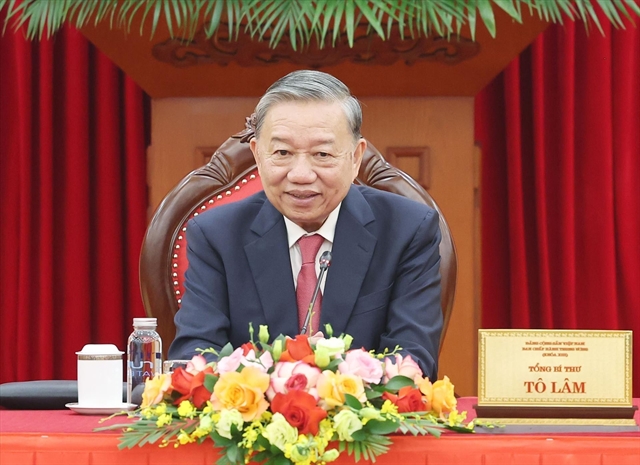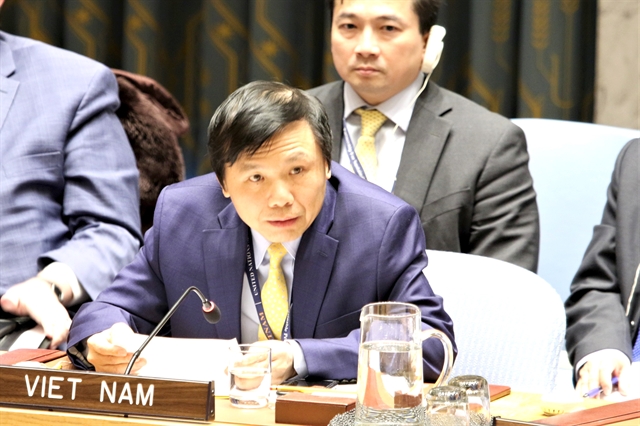 Politics & Law
Politics & Law

Vietnam News Agency correspondent in New York has spoken with Ambassador Đặng Đình Quý, head of Việt Nam’s delegation to the United Nations, on the two years the country has served as non-permanent member of the UN Security Council.

|
| Head of the Vietnamese delegation to the United Nations Đặng Đình Quý. — VNA/VNS Photo |
Vietnam News Agency correspondent in New York has spoken with Ambassador Đặng Đình Quý, head of Việt Nam’s delegation to the United Nations, on the two years the country has served as non-permanent member of the UN Security Council.
How do you feel now that Việt Nam has completed its 2020-21 tenure on the UN Security Council? Have we achieved the stated goals?
I am glad the work has been completed, but couldn’t help but feel a little ‘nostalgic’ since we have got used to the workflow. In the two-year tenure, Việt Nam has participated in 840 meetings from ambassador level and above, taken part in negotiations and adopted 254 documents.
In the month that Việt Nam served as President of the council, 26 were passed. We led putting forward initiatives, drafting and negotiating the drafts two UN Security Council’s resolutions and three Presidential statements.
We have also proposed and negotiated on two UN General Assembly’s resolutions, together with Germany set up A Group of Friends on the 1982 UN Convention on the Law of the Sea (UNCLOS), which has drawn the most participants among the friends group at the UN.
We have achieved all our expected goals, and even surpassed some.
In 2021, the world faced myriad challenges due to COVID-19 pandemic and fresh conflicts. How did these developments affect the implementation of our agenda in the second year on the council?
The pandemic has forced changes to the council’s working, including a switch to virtual meetings, mixed format or sometimes in-person, each country has their own opinion on which should be done.
Due to the pandemic, problems related to conflict zones became even more complicated, given how the UN could not rotate the human resources and peacekeepers, and notably, the emergence of new conflicts in Yemen, Sudan, Tigray, Ethiopia or right within our Southeast Asia region, the Myanmar situation, which has put a lot more burden on us, a lot of work and adjustments.
Many experts have stated one of the roles of non-permanent members of the UN Security Council is to moderate the differences and disagreements between the permanent members. How has this role come into play during our tenure?
Everyone knows how the five major powers, or P5, that have the permanent seats on the council hold significant sway, if not to say they decide on the affairs of the council. Every time these countries are at loggerheads, the council came to a ‘stalemate’ where no decisions could be made. The ten countries who served as non-permanent members in the past two years have carried out their moderation role in two ways.
First, we ‘gather forces’ to create a counterbalance against the P5, and we have succeeded in the case of Syria. During the talks and adoption of the resolution for the humanitarian aid for Syria, all 10 non-permanent members voted for, one permanent member voted for, while the remaining four abstained. Thanks to the 10 votes of the permanent members, the resolution was passed.
Second, while some non-permanent members are aligned with other permanent members, they all have the ultimate goal of moderation between the major powers to find the common ground so that the council could reach a decision.
What has made our tenure a success?
First, we have plenty of political capital, the heroic history of the people and our successes in the recent reforms (Đổi mới) efforts. Second, we have the right foreign policies. Third, we have the right steering and implementation mechanisms to carry out those policies, including activities on the council.
For me, I deeply appreciate two things. First, it’s the “Hồ Chí Minh diplomacy,” or ‘winning hearts and minds’ diplomacy. With a partner, reason and sentiments both matter during argument/fighting, principles are important just as sentiments. And this is what we are doing at multilateral forums, trying to win hearts and minds. Second, it’s the trust. The Party and the State have entrusted me with the responsibility, and this confidence fuelled us to complete the jobs and put in more effort in every mission we are tasked with.
What do you think is the differences between Việt Nam’s second tenure on the council in 2020-21 compared to our first stint in 2008-09?
The circumstances were different, the global context was different, and the relations between the countries in the council were also different, and particularly, the COVID-19 pandemic engulfed the world in the past two years, a thing we did not experience during the first time on the council.
Việt Nam made plenty endeavours during both times, but in 2020-21 tenure, we had drawn from the experience of the last one.
During 2008-09, a resolution on women, peace and security that we spearheaded was adopted, and in the 2020-21 tenure, it was the resolution on protection of objects indispensable to the survival of the civilian population. These are Việt Nam’s contributions and will have long-lasting meaning to the UN’s mission of maintenance of international peace and security.
As the head of the Việt Nam’s delegation to the UN for the past two years, could you tell us how Việt Nam has carried out reforms in foreign policies at the world’s largest multilateral forum?
The Party’s orientation is to elevate multilateral foreign affairs, and to that end, we must do three things – to have an initiative, conduct effectively the role of a coordinator and a mediator, and finally, leadership.
In the past two years, we have put forward many initiatives, evidenced in the resolutions and documents we have contributed to, drafted and led the negotiations, and eventually have it adopted as I have mentioned.
For the mediation part, we have ‘stood between’ the major powers and groups of countries to help them understand each other better, to help countries gain an insight into the Myanmar situation, into the North Korean situation with regards to nuclear issues on the Korean peninsula, or when disagreements between members inactive issues like security, climate or Syria or Yemen.
With regards to leadership, we have successfully campaigned to have the UN adopt December 27 as the International Day for Epidemic Preparedness, and with this, every year, Việt Nam will be the leading voice calling on countries reminding them of the importance of preparations for diseases and pandemics.
We have also set up the group of friends on the 1982 UNCLOS, which so far has a record 113 members and still counting. The group convenes every three months, discussing all issues related to the application of international law in a way that allow countries to still retain their interests, but the common interests – for the sake of international peace and security – are also upheld.
These are the three areas that the Vietnamese delegation have done to elevate the country’s foreign policy at the UN, the world’s most important multilateral forum. — VNS